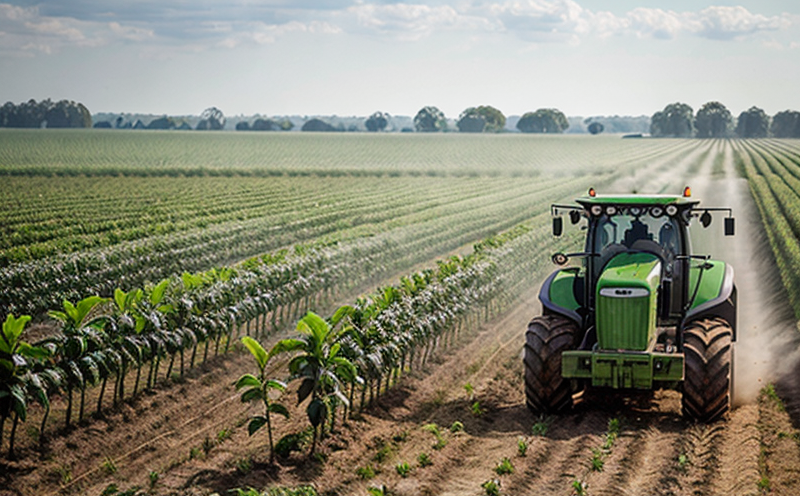JIS K0085 Agricultural Chemical Residue Testing by Chromatography
The JIS K0085 standard specifies methods for determining pesticide residues in agricultural products using gas chromatography (GC) and liquid chromatography (LC). This service is essential for ensuring the safety of foodstuffs, feedstocks, and other agricultural products. Compliance with this standard guarantees that the levels of pesticides are within acceptable limits set by regulatory bodies, thus protecting public health.
Our laboratory uses state-of-the-art equipment to perform JIS K0085 testing. Our team of experienced chemists ensures accurate and reliable results, providing you with peace of mind regarding your product's safety. This service is particularly crucial for manufacturers, suppliers, and distributors who need to ensure their products meet international standards.
The process begins with the collection of a representative sample from the agricultural product in question. The sample preparation involves thorough extraction techniques designed to remove all trace amounts of pesticides. Once prepared, the samples are analyzed using either gas chromatography or liquid chromatography, depending on the type of pesticide and its chemical properties.
Gas Chromatography (GC) is often used for volatile compounds, while Liquid Chromatography (LC) handles non-volatile substances more effectively. After separation, detection occurs through various methods such as mass spectrometry or flame ionization detectors. Our lab employs rigorous quality control measures throughout this process to ensure that no step introduces variability into the results.
The analysis aims at identifying not only known pesticides but also metabolites formed during plant metabolism. By detecting these residues accurately, we can assess whether they fall below safety thresholds defined by JIS K0085 and other relevant regulations worldwide.
Our service goes beyond mere compliance; it provides actionable insights into potential issues within your supply chain or manufacturing processes. For instance, if certain pesticides exceed allowable limits, our reports will highlight this so that corrective actions can be taken immediately. This proactive approach helps prevent costly recalls later on while maintaining brand integrity.
In summary, JIS K0085 Agricultural Chemical Residue Testing by Chromatography ensures not only regulatory compliance but also enhances food safety and quality assurance practices across the industry. With our expertise and advanced technology, you can trust us to deliver accurate results that meet your specific needs.
Why It Matters
Agricultural chemical residues pose significant risks if found in excess amounts in agricultural products consumed by humans or animals. These chemicals are designed to protect crops from pests and diseases but can have adverse effects when present at levels higher than recommended limits. Therefore, it is crucial for businesses involved in agriculture, food processing, and distribution to adhere strictly to international standards like JIS K0085.
- Promotes consumer confidence: By ensuring that agricultural products contain permissible amounts of pesticides, we build trust among consumers about the safety of their purchases.
- Enhances reputation: Companies known for maintaining high standards regarding pesticide residues gain a positive image and competitive advantage in markets demanding stringent quality controls.
- Avoids legal issues: Non-compliance with JIS K0085 can lead to hefty fines, lawsuits, or even bans on affected products. Thus, adhering to this standard helps avoid these pitfalls.
- Supports sustainable practices: Proper management of pesticide use promotes environmental sustainability by minimizing harm to non-target organisms and reducing pollution.
In essence, JIS K0085 testing plays a vital role in upholding public health standards while fostering responsible agricultural practices. It serves as both a safeguard for consumers and an enabler for businesses operating ethically and efficiently within the global market.
Applied Standards
The JIS K0085 standard is one of several international guidelines used globally to regulate pesticide residues in agricultural products. While it focuses primarily on Japanese markets, its principles align closely with other major standards such as:
- ISO 11269-1: General requirements for the establishment, maintenance and improvement of a quality management system.
- ASTM E2574: Practice for sampling, packaging, transporting, and storage of fresh fruits and vegetables.
- EN 15369: Pesticide residues in food of plant origin - Determination by gas chromatography-mass spectrometry (GC-MS).
- IEC TS 62478: Guidelines for the measurement and reporting of energy consumption.
These standards collectively form a framework that ensures consistency across different geographical regions, allowing seamless trade between countries with varying regulatory requirements. Our laboratory adheres strictly to JIS K0085 while also staying updated on these international guidelines to ensure comprehensive coverage.
Quality and Reliability Assurance
At our laboratory, quality and reliability assurance are paramount in delivering accurate results that meet the highest standards. Here’s how we achieve this:
- Calibration of Equipment: All instruments used for JIS K0085 testing undergo regular calibration to ensure precision and accuracy.
- Standard Operating Procedures (SOPs): Our team follows strict SOPs that have been validated through extensive validation studies. These protocols cover every aspect from sample collection to final reporting.
- Internal Audits: Regular internal audits are conducted to monitor compliance with established procedures and identify areas for improvement.
- Cross-Checking Results: Each result is cross-checked independently by two analysts before being finalized. Discrepancies are resolved through detailed discussions until consensus is reached.
- Data Management: Our robust data management systems ensure secure storage and easy retrieval of all analytical data associated with each sample analyzed under JIS K0085 standards.
By adhering to these rigorous practices, we guarantee that every test performed meets the stringent requirements set forth by JIS K0085. This commitment ensures you receive reliable results that are accurate and trustworthy.





